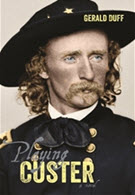|
News
|
|
Friday, 05 February 2016 00:00 |
|
The Historical Novel Society Reviews Playing Custer
  The following is a copy of the review of Playing Custer posted on the Historical Novel Society's website. To read the review on their site, click here. The following is a copy of the review of Playing Custer posted on the Historical Novel Society's website. To read the review on their site, click here.
"June 2001. A home economics teacher and a software engineer drive from Texas to Montana to reenact the 125th anniversary of Custer's Last Stand. En route, the teacher wonders what is normal, finally deciding, "...normal to a true enactor of a historical moment is exactly the opposite of what normal is in the untranscended world."
Composed of nearly forty monologues, Playing Custer is not a "normal" novel. The author moves quickly from 2001 to 1876, introducing the desires and demons that drove soldiers, Indians, and the extended Custer family to the banks of the Little Bighorn River. As the battle date approaches, time shifts forward and back, interweaving the lives of the reenactors and their 19th-century doppelgängers.
Duff gives his twenty characters unique voices through diction, not dialect or cliché. Former boxer Patrick Bruce establishes his County Cork ancestry through cadence and word choice, avoiding cheap brogue. Bloody Knife's awkward syntax reflects his mixed Sioux/Ree parentage. After the pain and thirst of the Sun Dance, Sitting Bull's language circles upon itself in poetry and confusion: My "dream was complete in the way a picture made with colored sand is done when the artist feels it comes all the way into itself." Those who survive the battle, such as Captain Frederick Benteen, offer glimpses of the future, "They tell me [Custer's request for reinforcements is] at West Point now, behind a big sheet of glass."
An authoritative author, in command of both fact and language, Duff creates a world where fictional characters and historical people strive simultaneously in the present and the past."
|